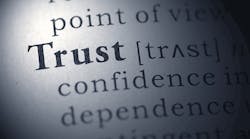If your company was a team would it be a basketball team or a golf team?
What's important about the answer is that it reveals the level of trust that resides in your organization. While a golf team is composed of individual scores grouped together, a basketball team must trust that each player values teamwork above individual ability.
The role of trust as a foundation to business success was the topic at a conference I attended in November on workplace issues. Patrick Lencioni, author of The Five Dysfunctions of a Team, presented examples of companies that had CEOs who trusted their teams, and compared their success to CEOs who did not trust their workforce.
But it's not just at the CEO level where trust is important.
Sitting in on a panel discussion of human resource directors offering best practices on how automating some HR functions increased productivity and profits, the issue of trust was front and center. However, I'm sure the speakers didn't even realize it.
One HR manager of a large national food company explained the many ways that employees cheated the system via buddy punching and improper reporting of time. His tone and choice of words when referring to his employees were very unsettling. I thought to myself, "I wouldn't like to work for someone who would view me as a potential thief."
In juxtaposition, the HR manager of a Tier 1 automotive supplier talked about how he collaborates with his employees before making any HR policy. In fact he insists that everyone in his department spend two weeks on the manufacturing floor so they understand the daily lives of the employees. By doing this, they become champions of the employees and only create policies that fit well within the employees' workflow.
Again the underlying principle is trust. While the first manager believes that employees will inherently scam the system, the second looks to employees to come up with ideas.
Trust, unfortunately, is hard to come these days, by according to a recent study by the American Psychological Association (APA), which found that one in four employees don't trust their employer at all.
Lack of trust can reverberate throughout an organization. Lencioni pointed out that open, honest discussion is essential to evaluating everything from company processes to product development. "Great teams do not hold back with one another," he says. "They are unafraid to air their dirty laundry. They admit their mistakes, their weaknesses and their concerns without fear of reprisal. If we don't trust one another, then we aren't going to engage in open, constructive, ideological conflict." Conflict, Lencioni believes, is essential to being competitive in the marketplace.
"When there is trust, conflict becomes nothing but the pursuit of truth, an attempt to find the best possible answer," explains Lencioni. Those answers could solve an organizational problem which is undermining productivity or it could create a solution that becomes a new product.
When the APA examined what kind of work environment leads to trust, they found that there were three key things: employees' perception of the level of involvement they have in their organization; recognition provided by their organization; and how well the organization communicates. "If people don't weigh in, they can't buy in," says Lencioni.
One way to earn employees' trust, according to David DeSteno, author of The Truth about Trust, is to be transparent and truthful. In a recent Harvard Business Review article, he suggests sharing information about the current health and future goals of the company. "If you can't tell people the hard stuff," he notes, "they won't trust you."



